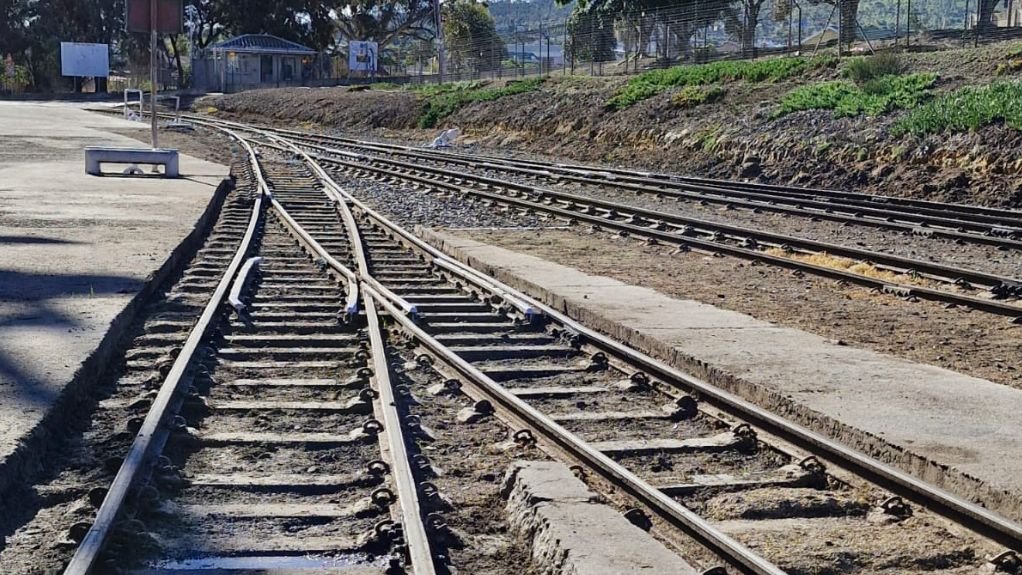Western Cape maltings plant returns to rail transport



SUSTAINABLE RAIL Having engaged with government and industry stakeholders to establish the basis for long-term, sustainable rail operations, SAB has resumed transporting some of its inputs by rail
RICHARD RIVETT-CARNAC Relocating a significant portion of freight volumes to rail has reduced heavy vehicle movement and improved safety for surrounding communities
The Caledon Maltings plant was originally designed with rail intake in mind, says beer producer South African Breweries (SAB) CEO Richard Rivett-Carnac.
The facility is one of the largest malting plants on the continent, at which SAB produces malted barley for its beer production.
Once processed into malt, the barley is sent to SAB’s seven breweries across South Africa. Rail was initially the preferred mode of transport, as it was regarded as the most natural fit for the operation.
However, with the decline of the rail sector in South Africa, Rivett-Carnac says the company was forced, over time, to shift to road transport. “From around 2010, increased reliance on trucks became necessary to maintain service levels,” he explains.
While trucks enabled SAB to move malt from the plant to breweries, the system soon proved unsustainable and inefficient. “Congestion around our plants has been a growing challenge in recent years,” Rivett-Carnac explains.
With rail reforms now under way, SAB decided it was time to reintroduce rail into its supply chain.
After engaging with government and industry stakeholders to establish the basis for long-term, sustainable rail operations, SAB has resumed transporting some of its stock by rail.
“By rebalancing the use of both rail and road, we have been able to achieve a more efficient and sustainable distribution system for barley,” Rivett-Carnac says.
He stresses that the transition also brings SAB closer to meeting its 2030 Sustainability Goals, particularly in climate action and smart agriculture.
“Rail transport reduces our carbon footprint while also supporting the broader agricultural value chain. As we mark 130 years of operations in South Africa, initiatives such as this demonstrate our commitment to building a future where logistics and sustainability are in harmony.”
Rivett-Carnac adds that SAB’s immediate focus is on restoring rail volumes and returning operations to the way the plant was originally intended to function. The key challenge, he explains, is ensuring that the shift does not compromise supply reliability, which requires strong collaboration with partners and alignment on infrastructure readiness.
He emphasises that investment in infrastructure upgrades, adoption of new technology, supportive policy frameworks and community engagement are essential to building resilience into the system. “These measures not only safeguard reliability today but also ensure that rail remains a futureproof solution capable of adapting to climate and economic challenges,” he states.
The benefits of the shift are already being realised. “Environmentally, rail is far more energy-efficient and generates fewer greenhouse-gas emissions per ton per kilometre compared with road, while also reducing air pollution,” Rivett-Carnac says. From a safety perspective, he highlights that fewer trucks on the road mean fewer accidents and less congestion, which improves safety around SAB’s plants and depots.
The economic advantages are also significant. Rivett-Carnac notes that rail is more cost-effective than road when moving bulk volumes over long distances, while also helping to reduce the maintenance burden on roads. “There are also positive social impacts, with rail projects creating jobs in construction, operations and maintenance. Together, these benefits support SAB’s goal of shaping a logistics system that is safer, greener and more efficient; a direction we see as a legacy for the next 130 years,” he says.
Traffic Bottlenecks
In the Western Cape, the shift has eased traffic bottlenecks. Rivett-Carnac says relocating a significant portion of freight volumes to rail has reduced heavy vehicle movement and improved safety for surrounding communities. “This shift has strengthened our relationship with local stakeholders, including municipalities, as we work together to ensure safer and more reliable operations,” he explains.
The Western Cape Mobility Department recently recognised the Caledon Maltings rail initiative, which Rivett-Carnac says shows the importance of public–private collaboration. “The recognition affirms the importance of this initiative and lends credibility to the project, making it easier to secure investment, attract public support and unlock additional government partnerships,” he says.
Looking more broadly, Rivett-Carnac argues that similar public–private partnerships will be vital to expanding the use of rail in other industries and provinces.
“Recently, the national rail service provider invited SAB to explore a customer-led solutions framework as part of its Repositioning and Growth Strategy. This kind of collaboration is essential for creating scalable, sustainable logistics solutions that can transform entire sectors, not just the brewing industry,” he says.
He believes that shifting more bulk freight to rail could be transformative for mining, agriculture and manufacturing, as these sectors could benefit from cost savings, efficiency gains and improved supply chain resilience.
For companies considering a similar transition, Rivett-Carnac advises careful planning and long-term commitment.
“Some of the key lessons we have learned include the importance of infrastructure readiness, the value of maintaining a hybrid approach that combines road and rail, and the role of data-driven performance monitoring in identifying bottlenecks and continuously improving operations,” he says. Above all, he stresses that modal shifts should be viewed as ongoing journeys rather than once-off projects.
Article Enquiry
Email Article
Save Article
Feedback
To advertise email advertising@creamermedia.co.za or click here
Press Office
Announcements
What's On
Subscribe to improve your user experience...
Option 1 (equivalent of R125 a month):
Receive a weekly copy of Creamer Media's Engineering News & Mining Weekly magazine
(print copy for those in South Africa and e-magazine for those outside of South Africa)
Receive daily email newsletters
Access to full search results
Access archive of magazine back copies
Access to Projects in Progress
Access to ONE Research Report of your choice in PDF format
Option 2 (equivalent of R375 a month):
All benefits from Option 1
PLUS
Access to Creamer Media's Research Channel Africa for ALL Research Reports, in PDF format, on various industrial and mining sectors
including Electricity; Water; Energy Transition; Hydrogen; Roads, Rail and Ports; Coal; Gold; Platinum; Battery Metals; etc.
Already a subscriber?
Forgotten your password?
Receive weekly copy of Creamer Media's Engineering News & Mining Weekly magazine (print copy for those in South Africa and e-magazine for those outside of South Africa)
➕
Recieve daily email newsletters
➕
Access to full search results
➕
Access archive of magazine back copies
➕
Access to Projects in Progress
➕
Access to ONE Research Report of your choice in PDF format
RESEARCH CHANNEL AFRICA
R4500 (equivalent of R375 a month)
SUBSCRIBEAll benefits from Option 1
➕
Access to Creamer Media's Research Channel Africa for ALL Research Reports on various industrial and mining sectors, in PDF format, including on:
Electricity
➕
Water
➕
Energy Transition
➕
Hydrogen
➕
Roads, Rail and Ports
➕
Coal
➕
Gold
➕
Platinum
➕
Battery Metals
➕
etc.
Receive all benefits from Option 1 or Option 2 delivered to numerous people at your company
➕
Multiple User names and Passwords for simultaneous log-ins
➕
Intranet integration access to all in your organisation


















